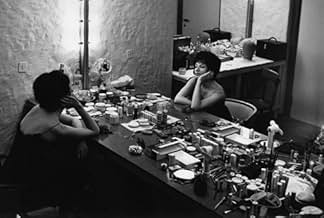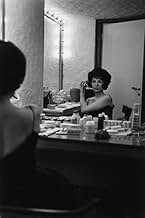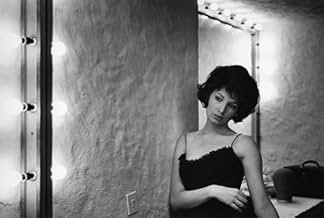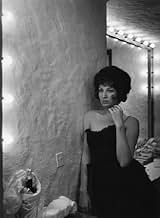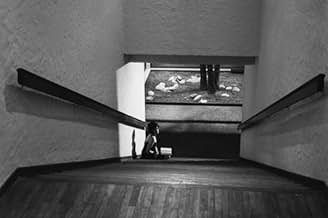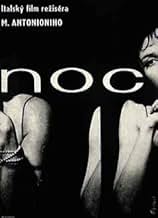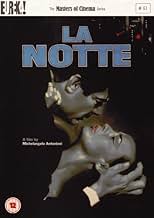Um dia na vida de um casamento infiel e sua relação em constante deterioração.Um dia na vida de um casamento infiel e sua relação em constante deterioração.Um dia na vida de um casamento infiel e sua relação em constante deterioração.
- Direção
- Roteiristas
- Artistas
- Prêmios
- 6 vitórias e 4 indicações no total
- Il signor Fanti
- (as Guido Ajmone Marsan)
- Sé stesso
- (não creditado)
- Un invitato alla festa
- (não creditado)
- Sé stesso
- (não creditado)
Avaliações em destaque
As the film opens, one morning in Milano, married couple Giovanni (Marcello Mastroianni) and Lidia (Jeanne Moreau) visit their friend Tomasso (Bernhard Wicki) in the hospital as he lays dying. Lidia is clearly shaken by the experience and, after Giovanni leaves for an appearance to promote his new book, the camera tracks Lidia through a long, aimless walk around Milano as she processes her thoughts. Here Antonioni (anticipating his later film Il Deserto Rosso) shows the drastically changing face of Milano in the postwar construction boom, and the appearance of new tech gadgetry in everyday life, as just one more way people can feel they have nothing certain they can hold on to in this world.
Giovanni and Lidia, while never outright squabbling, have clearly grown cold towards each other. Gradually one begins to wonder if there is any life left in their marriage whatsoever. Things come to a head, however, when Giovanni and Lidia go that evening to a party at a rich industrialist's villa, and Antonioni's favourite actress Monica Vitti appears. Vitti's role as a foil to Giovanni and Lidia is powerful and moving, but I think its precise nature should be left unsaid here, as it's better audiences aren't spoiled first.
A mere description of the plot might seem like nothing happens in this film besides bored people talking and yet another mid-century European cinematic tale of adultery. But LA NOTTE is a film of incredible visual poetry, almost like the work of Andrei Tarkovsky. Even scenes that evoke the characters' boredom are shot as such beautiful tableaux that the viewer is enraptured. Antonioni often shoots his characters reflected in mirrors and the like, and there is some cinematic legerdemain here that just makes you go "wow".
Appearing in Antonioni's body of work between two similar films that are often considered a trilogy, LA NOTTE has often got less buzz than its predecessor L'AVVENTURA, with its daring plot twist, or its successor L'ECLISSE with its chic Monica Vitti-Alain Delon love affair. But I think that in terms of the picture-perfect visuals and elegant pacing, LA NOTTE deserves every bit as much praise as those other two classic films.
I don't want to get into the plot too much, but this film is more about feeling. The friction and differences between husband and wife are explored.
Antonioni doesn't force anything, he allows a scene to play out in proper time. This film is full of symbolism and despair.
All of these little, seemingly mundane moments are not all that the film is made up of, and it is in this existential (if it is relatively speaking) crisis for this couple that what real life that's out there and real pains strike up here and there. I loved the moment where Mastroianni is confronted by a seemingly crazy girl at the hospital; is she really crazy, or just desperate for someone's affection or attention (she is later beat into submission by the nurses)? Or when Moreau sees a fight break out with some young men in the less well-off section of town, the hesitation and surprise suddenly throws the fighters off. The party itself- where-in the 'Night' of the title is revealed- has moments of dialog that strike up the symbolic points Antonioni is making. But unlike the director's previous film, the visual-side of the cinematography has its moments but not necessarily as extraordinary in its overall make-up. Yet the initial peaks of interest- both in the actors (particularly Moreau who is always a treasure) and in the final, contemplative act with Monica Vitti, endures with better results.
Maybe the least in the 'trilogy' that Antonioni made between 1960 and 1962, which still makes it more watchable than the usual art-house bores of late. There is almost TOO much room for pondering about these characters, which makes for what could be seen as 'dull', but it really isn't. Detached, maybe, but not hard to connect with if open enough, this is a very good film if not one of the director's best.
The couple visit a seemingly dying friend in the hospital, attend a book signing for the husband's new novel, stop at a nightclub where they barely even react to an erotic floor show, and then head to a party for a rich industrialist who is celebrating the first win by his new racehorse, Both Marcello Mastroianni and Jeanne Moreau do terrific work as the deadened and estranged couple. He no longer even identifies with his own writing, feeling it's just a product, like that made by the industrialist. He's even lost his sense of lust. She no longer feels love for him, and seems locked in loneliness and depression. It's a tough movie to take, grim, humorless, almost as dead feeling as its leads, but that would seem to be the point.
My only problem, as I've occasionally had with Antonioni, is that well before the end I felt I had gotten these themes clearly and powerfully, and there was, after that, a certain sense of hammering home ideas that had already been expressed beautifully with a lighter touch (there's a key reveal near the end that I saw coming a mile off). But the images (of course) are striking and memorable, as are the performances, and the sad gloom that hovers over this world of people who seem to have it all, and yet feel so little.
Você sabia?
- CuriosidadesThis movie is considered the central film of a trilogy of alienation or unofficial "Incommunicability Trilogy" beginning with A Aventura (1960) and ending with O Eclipse (1962).
- Erros de gravaçãoWhen Giovanni pours champagne in the hospital, Bernhard Wicki (Tommaso) looks straight into the camera while turning his head from Lidia to Giovanni.
- Citações
Lidia: [reading from a piece of paper] "When I awoke this morning, you were still asleep. As I slowly emerged from my slumber, I heard your gentle breathing and through the wisps of hair over your face I saw your closed eyes and I could barely contain my emotion. I wanted to cry out, to wake you up, because you slept so deeply, you almost seemed lifeless. In the half light, the skin of your arms and throat appeared so vibrant, so warm and dry that I longed to press my lips against it, but the thought of disturbing your sleep, of you awake in my arms again, held me back. I preferred you like this, something on one could take from me bacause it was mine alone - - this image of you that would be everlasting. Beyond your face I saw my own reflection in a vision that was pure and deep. I saw you in a dimension that encompassed all the times of my life, all the years to come, even the years past as I was preparing to meet you. That was the little miracle of this waking moment: to feel for the first time that you were and always would be mine and that this night would go on forever with you beside me, - with the warmth of your blood, your thoughts, and your will mixed with mine. At that moment, I realized how much I loved you, Lidia, and the intensity of the emotion was such that tears welled up in my eyes. For I felt that this must never end, that all our lives should be like an echo of this dawn, with you no belonging to me but actually a part of me, something breathing within me that could could ever destroy except the apathy of habit, which is the only threat I see. Then you awoke and with a sleepy smile, kissed me, and I felt there was nothing to fear that we'd always be as we were at that moment, bound by something stronger than time and habit."
- ConexõesFeatured in Cinq colonnes à la une: Episode dated 1 December 1961 (1961)
Principais escolhas
- How long is La Notte?Fornecido pela Alexa
Detalhes
Bilheteria
- Faturamento bruto nos EUA e Canadá
- US$ 39.236
- Fim de semana de estreia nos EUA e Canadá
- US$ 10.547
- 18 de set. de 2016
- Faturamento bruto mundial
- US$ 40.703
- Tempo de duração2 horas 2 minutos
- Cor
- Proporção
- 1.85 : 1
Contribua para esta página




